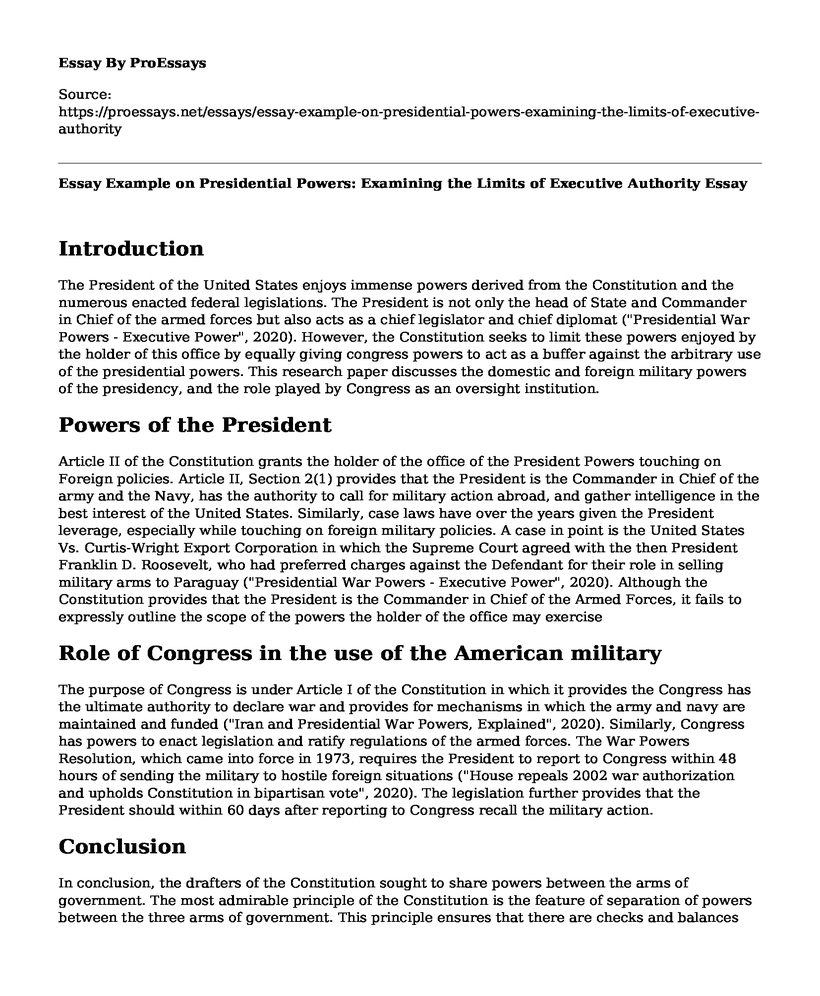Introduction
The President of the United States enjoys immense powers derived from the Constitution and the numerous enacted federal legislations. The President is not only the head of State and Commander in Chief of the armed forces but also acts as a chief legislator and chief diplomat ("Presidential War Powers - Executive Power", 2020). However, the Constitution seeks to limit these powers enjoyed by the holder of this office by equally giving congress powers to act as a buffer against the arbitrary use of the presidential powers. This research paper discusses the domestic and foreign military powers of the presidency, and the role played by Congress as an oversight institution.
Powers of the President
Article II of the Constitution grants the holder of the office of the President Powers touching on Foreign policies. Article II, Section 2(1) provides that the President is the Commander in Chief of the army and the Navy, has the authority to call for military action abroad, and gather intelligence in the best interest of the United States. Similarly, case laws have over the years given the President leverage, especially while touching on foreign military policies. A case in point is the United States Vs. Curtis-Wright Export Corporation in which the Supreme Court agreed with the then President Franklin D. Roosevelt, who had preferred charges against the Defendant for their role in selling military arms to Paraguay ("Presidential War Powers - Executive Power", 2020). Although the Constitution provides that the President is the Commander in Chief of the Armed Forces, it fails to expressly outline the scope of the powers the holder of the office may exercise
Role of Congress in the use of the American military
The purpose of Congress is under Article I of the Constitution in which it provides the Congress has the ultimate authority to declare war and provides for mechanisms in which the army and navy are maintained and funded ("Iran and Presidential War Powers, Explained", 2020). Similarly, Congress has powers to enact legislation and ratify regulations of the armed forces. The War Powers Resolution, which came into force in 1973, requires the President to report to Congress within 48 hours of sending the military to hostile foreign situations ("House repeals 2002 war authorization and upholds Constitution in bipartisan vote", 2020). The legislation further provides that the President should within 60 days after reporting to Congress recall the military action.
Conclusion
In conclusion, the drafters of the Constitution sought to share powers between the arms of government. The most admirable principle of the Constitution is the feature of separation of powers between the three arms of government. This principle ensures that there are checks and balances between these arms of government. Despite the clear and distinct roles played by the three branches of government, the executive has at times of emergencies and wars seemed to eclipse the other two arms of government.
References
House repeals 2002 war authorization and upholds Constitution in bipartisan vote. Washington Examiner. (2020). Retrieved 13 April 2020, from https://www.washingtonexaminer.com/house-repeals-2002-war-authorization-and-upholds-constitution-in-bipartisan-vote
Iran and Presidential War Powers, Explained. Nytimes.com. (2020). Retrieved 13 April 2020, from https://www.nytimes.com/2020/01/06/us/politics/war-powers-resolution-iran.html
Presidential War Powers - Executive Power. Nytimes.com. (2020). Retrieved 13 April 2020, from https://www.nytimes.com/interactive/2019/us/politics/presidential-war-powers-executive-power.html.
Cite this page
Essay Example on Presidential Powers: Examining the Limits of Executive Authority. (2023, May 21). Retrieved from https://proessays.net/essays/essay-example-on-presidential-powers-examining-the-limits-of-executive-authority
If you are the original author of this essay and no longer wish to have it published on the ProEssays website, please click below to request its removal:
- Changing Our Perception and Policies of Sexual Violence - Essay Sample
- Essay Sample on Modern Bureaucracy: A Systematic Organization of Governments
- Government of Austin: Tax & Other Revenues for Financial Progress - Essay Sample
- Essay Example on Public vs. Private Policing: Exploring the Complexities
- Essay Example on Municipalities: Balancing Local, Provincial and National Interests
- Nurses: Influencing Health Care Policy Essay Example
- Excellent Clinical Admin & HRM: Quality Care in Modern Medicine - Free Report







